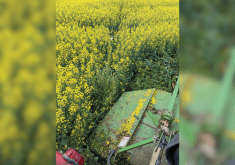The Canadian Grain Commission is seeking feedback on proposed changes to the licensing of some groups in the grain industry.
If a grain-handling operation meets the definition of an elevator or grain dealer under the Canada Grain Act, it must be either licensed or exempted by the grain commission. Licensing implies that a bond or similar arrangement be posted with the commission to cover the outstanding grain receipts that a licensee has. The commission can grant an exemption if a facility doesn’t purchase grain from producers or if it does not pose a significant risk to the grain quality assurance system.
Read Also

Farming Smarter receives financial boost from Alberta government for potato research
Farming Smarter near Lethbridge got a boost to its research equipment, thanks to the Alberta government’s increase in funding for research associations.
The proposed changes would affect producer car loading facilities, grain agents, and feed mills, said provincial crop market analyst Neil Blue.
“The proposal is that producer car loading facilities would become licensed, but still not need to provide a bond,” he said. “The new conditions would require grain that is loaded to be documented according to grade and weight. Existing weighing equipment would become subject to Measurement Canada compliance.
“The new rules would formalize the conditions that grain would be required to be loaded into a rail car and that the loading facility would not be allowed to purchase grain from producers or deal in grain.”
Grain agents are those companies that act on behalf of a licensed company.
“Under the proposed changes, grain agents would no longer be exempt from licensing, but agent companies that don’t buy from producers would post a security amount reflecting their low risk to producers,” said Blue.
The third group for proposed change is feed mills.
“In the last few years, some feed mills have failed, leaving producers with losses,” said Blue. “After consultations, the CGC is proposing to license feed mills that buy more than 5,000 tonnes of grain per year. The reporting aspect of licensing will also provide more complete grain-handling statistical information to the CGC and the industry.”
Stakeholders have until Aug. 31 to comment on proposals to license producer railway loading facilities, agents and feed mills. To do so, go to grainscanada.gc.ca.















